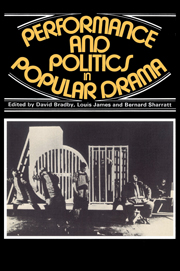 Performance and Politics in Popular Drama
Performance and Politics in Popular Drama Book contents
- Frontmatter
- Contents
- List of contributors
- Preface
- Acknowledgements
- PART ONE Spectacle, performance and audience in nineteenth-century theatre
- PART TWO Politics and performance in twentieth-century drama and film
- PART THREE Problems and prospects
- Introduction
- The politics of the popular? – from melodrama to television
- After Fanshen: a discussion, with the Joint Stock Theatre Company, David Hare, Trevor Griffiths and Steve Gooch
- Appendix: Tempo, Tempo
- Select bibliography
- General index
- Index of titles of plays, films, sketches
- Index of theatres, theatre companies and groups
After Fanshen: a discussion, with the Joint Stock Theatre Company, David Hare, Trevor Griffiths and Steve Gooch
Published online by Cambridge University Press: 08 March 2010
- Frontmatter
- Contents
- List of contributors
- Preface
- Acknowledgements
- PART ONE Spectacle, performance and audience in nineteenth-century theatre
- PART TWO Politics and performance in twentieth-century drama and film
- PART THREE Problems and prospects
- Introduction
- The politics of the popular? – from melodrama to television
- After Fanshen: a discussion, with the Joint Stock Theatre Company, David Hare, Trevor Griffiths and Steve Gooch
- Appendix: Tempo, Tempo
- Select bibliography
- General index
- Index of titles of plays, films, sketches
- Index of theatres, theatre companies and groups
Summary
David Hare, playwright: I'll try to fill you in as briefly as I can on the history of the play, how it came to be written and what's happened to it since it was written. Fanshen is a book of about five or six hundred pages by William Hinton, who was himself in China at the time of the story he describes. He spent some six or eight years writing what he wanted to be the definitive record of one village's life during those years of change. In summer 1974 Bill Gaskill and Max Stafford-Clark asked me to read it and to dramatise it for Joint Stock. Joint Stock had been started by them, from a much more aesthetic point of view than has since developed. That is to say, their original interests were in using theatrical spaces differently and in developing the work of certain actors in workshop. The first show that they did was The Speakers, which was a recreation of Speakers’ Corner. But the material of the book Fanshen pushed us all off in a direction which we didn't really know we were heading in. It's very important to stress this because, particularly in the hindsight of success, which always makes things seem very clearcut, it's always assumed that you know exactly what you were doing in creating a play. But like most plays Fanshen was created out of chaos and out of a very unclear sense of what our objectives were; and all the things that now seem apparent and definitive to us in Fanshen were achieved through struggle and through deep confusion and disagreement.
- Type
- Chapter
- Information
- Performance and Politics in Popular DramaAspects of Popular Entertainment in Theatre, Film and Television, 1800–1976, pp. 297 - 314Publisher: Cambridge University PressPrint publication year: 1980


